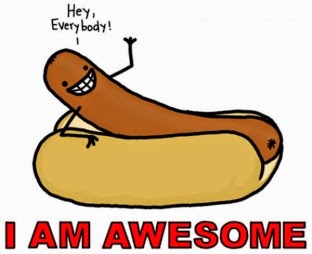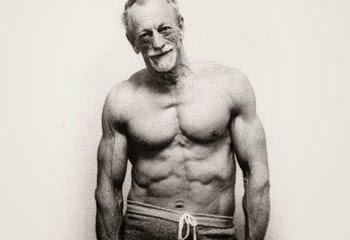There is a phenomenal podcast on
IMtalk with Dr Timothy Noakes discussing confidence and fatigue. He postulates that the brain functions as a
central governor over the body to determine pain and fatigue. It's similar to Psychologist's Richard Lazarus
Theory of Emotion, in that thoughts precede emotions and physiology. This is in contrast to the assumption that fatigued is due to physiological factors such as VO2max. Dr Noakes believes the brain anticipates what will happen in the future and tries to prevent biological harm. The key step is in the anticipation/expectation of the future. Confident athletes are going to anticipate more positive outcomes and keep the brain from worrying. Olympic marathoner Ryan Hall is convinced this is the reason for the success of Ethiopian and Kenyan runners. They expect to win and they don't worry about what is "physically" possible. Likewise, in emergency situations humans have accomplished some amazing feats because they were focused on what needed to be done rather than what was possible.
Doubt is thereby the poison that causes fatigue. In the 1989 Ironman, Dave Scott and Mark Allen were running side by side feeling strong and capable. With 3 miles to go, Allen opened up a gap and Dave stumbled. Doubt crept in and Dave was hit with a rush of pain. One minute he was fine, the next he could barely walk. I experience the same phenomena every time I squat. When I am confident the weight seems light, but when I worry the weight seems heavy. In a meta analysis, confidence was the most consistent factor distinguishing differences between highly successful and less successful athletes (Vealey, 2005).

Confidence is also a great way to compensate for under-training. I am a huge fan of slightly under-training to prevent injury, burn out, and maintain consistency. If an athletes gets to the starting line fresh and injury free, they at least have a chance. All too often people fill up their free time with more volume or intensity, which either helps a few percentage points or leads to injury. Spending more time on mental skills will help infinitely more and impart zero physiological damage.
The following are sources of Self-Efficacy according to renowned psychologist Albert Bandura:
Performance Accomplishments. Past accomplishments help build confidence. Refresh your mind of those accomplishments. In addition, create small realistic weekly challenges that allow for success. Lower the basketball hoop. Break a complicated task into manageable steps. Do Yasso 800s to predict your marathon time.
Vicarious Experiences. Watch someone model a behavior to see what is possible. No one ran a sub 4 minute mile until Roger Bannister. Then 46 days later another athlete broke the barrier with many more soon to follow. On a personal level, I saw a second tier female pro triathlete run a 3:19 marathon during an Ironman and it helped me realize I could do that. A little chauvinistic, but it helped.

Verbal Persuasion. Words from friends, coaches, or even self-persuasion builds confidence. Use a mantra, such as "Strong", to encourage yourself or say uplifting words to a friend. Likewise, having a
Growth Mindset, by focusing on effort and not innate ability, turns situations into learning opportunities vs. failures. No one is born fully developed. No one does well in calculus on the first day. View yourself as a work in progress. You are beautifully created and there is nothing you can do to add or subtract from your intrinsic value.
Imaginal Experiences. Use your imagination to visualize success, overcoming obstacles, or different sections of an event. Revisit my previous blog on
visualization for more suggestions.
Physiological States. How do you interpret physiological states? Does a fast heart beat or shallow breathing mean you will not perform well. OR is it a sign you're ready to race and the body is sending blood to your muscles. Act confidently by keeping your head high, smile, and stand tall. People often think their emotions dictate their behavior. We're happy therefore we smile, however the opposite is also true. Our actions can affect our physiology and our emotions. Try smiling and see how it makes you feel.
Emotional States. Happy athletes are more likely to be confident. Therefore do something fun or relaxing each day. Go for a walk, have a glass of wine, or call a friend. Another option is to practice Gratitude. Think of 3 things that went well each day and examine why. It will shift your mind from focusing on the negative to focusing on the positive. Focusing on the present moment can also help us be happy. By letting go of the past or worries about the future, all problems disappear. We can either do certain things right NOW or we can't. Become comfortable with the unknown and reframe it as waiting for a pleasant surprise. At the end of the day everything brings some amount of positive gain. In addition, accept your thoughts as just electrical impulses in your brain. Acknowledge that your thoughts are not facts and you cannot control them. Learn to observe them as harmless opinions. Judgement, of yourself and others, disappears when you see your thoughts as just opinions. They are not facts AND you do not have to act on them.










